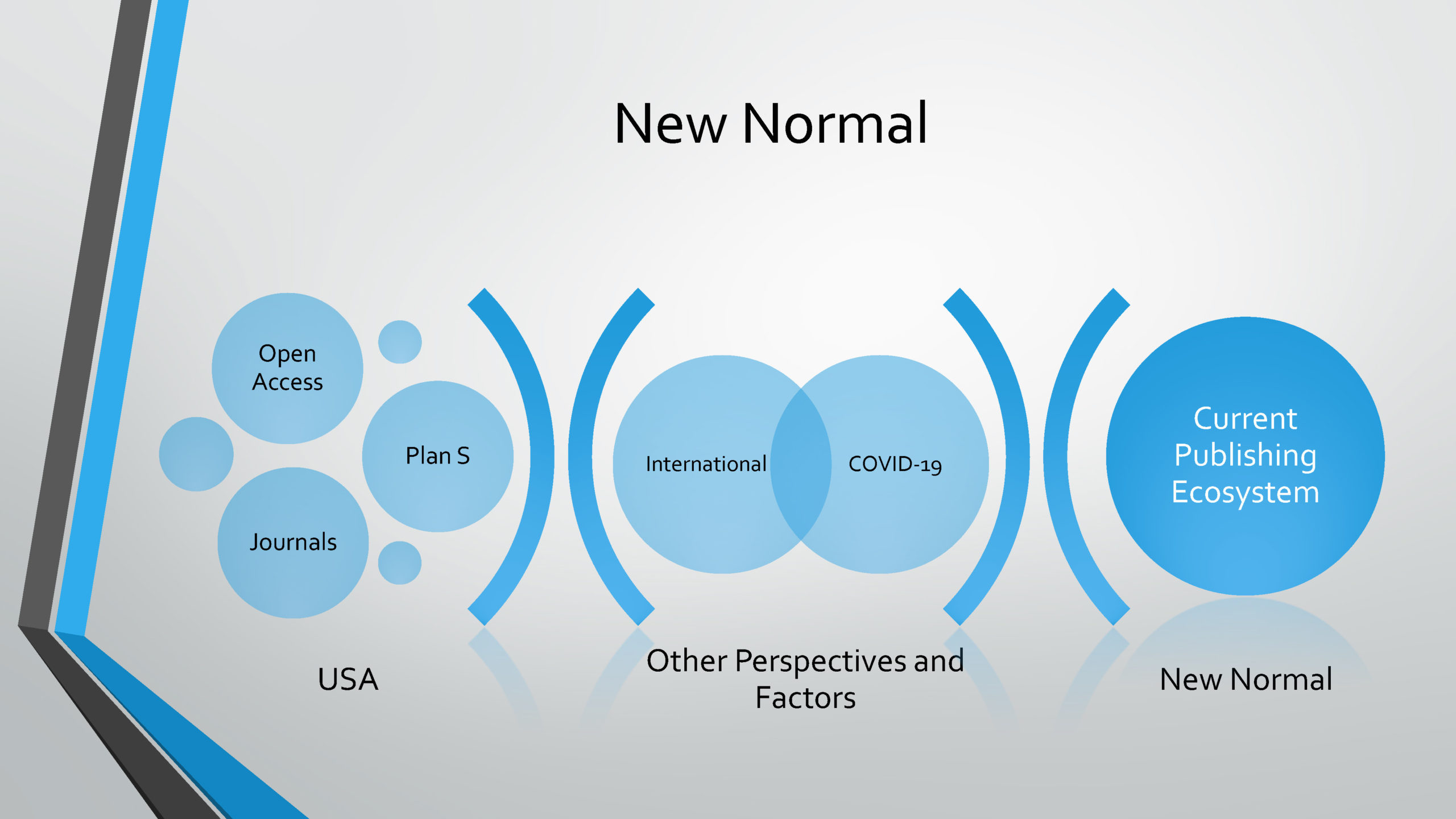MODERATOR:
Jennifer Deyton
Senior Partner
J&J Editorial
Cary, North Carolina
SPEAKERS:
Brittany Swett
Executive Director
J&J Editorial
Cary, North Carolina
Margaret Perkins
Managing Editor
New England Journal of Medicine
Boston, Massachusetts
REPORTER:
Judy Connors
Owner
Do It Write Editorial, LLC
Metro Philadelphia are
The impetus for this informative and timely discussion on Plan S was the ABEC (Associação Brasileira de Editores Cientificos) meeting in Brazil, where most journals are already Open Access (OA) and would not be affected as severely as other non-OA journals would be by the European move towards OA/Plan S. The persistent question is how other countries would address the potential implementation of Plan S. This session was developed to identify differences in potential Plan S implementation between the United States, South America, North America, Asia, and Europe. While the COVID-19 global pandemic has certainly slowed international participation, starting this conversation is critical.

The first speaker, Brittany Swett, discussed what editorial offices need to know now about Plan S. The publishing landscape ecosystem is complex and includes many participants—libraries, society publishers, authors, institutions, and commercial publishers—and, as such, publishing vendors, innovator/technology groups, non-profits and consultants all have a role to play in developing a plan. Swett stated, “The general disruption of the digital age, technology uses, and the speed of knowledge exchange have all caused a continual evolution in the landscape of sharing data.”
The scholarly publishing environment has undergone a transition, starting in the late 1990s when journal mergers and acquisitions dictated a new infrastructure for content dissemination. Add to the mix the emergence of digital data sharing and new technological workflow products and large publishers became more attractive to authors and societies struggling to complete with their services. That trend showed weakness moving into 2006: the smaller publisher share has increased and mega-journal share has decreased as authors demand more boutique services for their content sharing, such as full OA, low publication charges, rapid and nonselective peer review, and the ability to address subject matter with a broad scope. The OA philosophy has a large following that wants to use their content in perpetuity and does not want their IP behind a pay wall; thus, the appeal of Plan S.
COALITION S is the supporting body which believes no scholarly publication should be locked behind a paywall and content availability should be immediate and without embargoes. Research articles published and funded by Plan S organizations make up 7% of global publications and represent good research in high-impact journals typically managed by large publishing companies. Industry pushback has led to softening of initial Plan S requirements so that now there is no cap on Article Processing Charges (APCs), but publishers/journals need to be transparent about fees and use. Transformative Agreements offer a way for traditional subscription-based journals to have time to transition to fully OA. The tradeoff is that typically this will mean less favorable contract terms and less royalty to a society.
Margaret Perkins of the New England Journal of Medicine (NEJM) was the second speaker and discussed how her organization is implementing a data sharing policy. She said, “It is unclear how many of our authors are aware of OA; but recent survey results showed that 72% of authors who are said they’d continue to submit as often as now and it is not yet apparent that OA is a factor for our authors.” Still a subscription-based journal, NEJM offers free access to research articles through weekly online publication and immediate access to public health articles, particularly important during this pandemic. Perkins states that “Our COVID content includes all different types of content, videos, and interactive programs with expedited processing. We have seen a 500% increase in submissions largely, we think, because all COVID content is freely open and immediate.”
Both speakers agreed that COVID has slowed the Plan S initiative but that organizations should take this time to evaluate their content for availability and scope, work to facilitate data sharing, and develop what they think is the best approach to accommodate OA mandates for them, their authors, and readership.
Resources from the Session: Open Access and Plan S—An International Comparison
Resources—Brazil
- https://www.coalition-s.org/sao-paulo-statement-on-open-access/
- https://www.researchgate.net/publication/30864934_Brazilian_open_access_initiatives_key_strategies_and_challenges
- https://www.coalition-s.org/wp-content/uploads/Sao-Paulo-Statement-OA-01052019.pdf
Resources—Organizations
- https://covid19-trials.com/?utm_source=Newsletter&utm_medium=email&utm_content=News%253A+Global+COVID-19+Clinical+Trial+Tracker+launched+by+Cytel&utm_campaign=Cytel_COVID+Trial+Tracker+MAIN+Release
- http://hopkinshumanitarianhealth.org/empower/advocacy/covid-19/covid-19-children-and-nutrition/
- https://www.acs.org/content/acs/en/covid-19.html
- https://theacse.com/
- https://www.asianeditor.org/
- https://ease.org.uk/
- http://www.wame.org/
Resources—COVID-19
- https://www.sciencemag.org/news/2019/01/will-world-embrace-plan-s-radical-proposal-mandate-open-access-science-papers#
- https://www.coalition-s.org/addendum-to-the-coalition-s-guidance-on-the-implementation-of-plan-s/
- https://twitter.com/lisalibrarian/status/1248310914471821312
- https://oaspa.org/statements/
- https://www.stm-assoc.org/about-the-industry/coronavirus-2019-ncov/
- https://wellcome.ac.uk/coronavirus-covid-19/open-data
